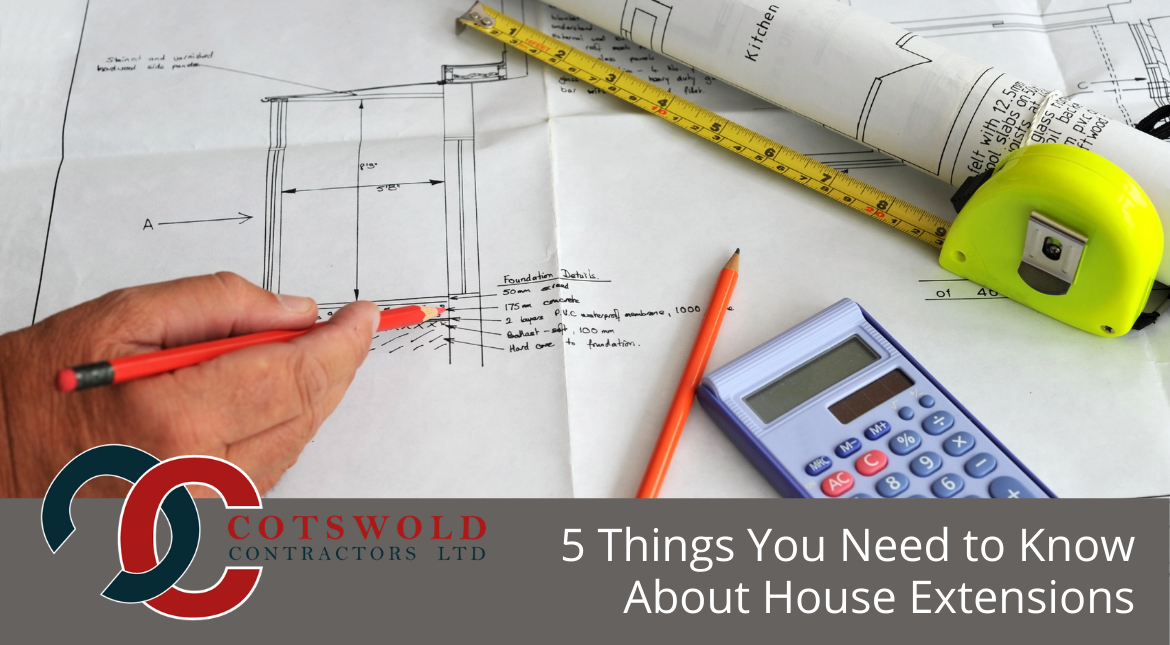We spend a lot of time in our homes and changing things up a bit can be an exciting idea. However, there are few things you need to know about house extensions projects before you dive into one yourself.
A global pandemic has kept us house-bound for the majority of the last year. This has given many people time to assess their surroundings and question how to use their space efficiently. A lot of us have struggled to find the extra space we need and have yearned for a change of scenery or something new to get excited about.
This time spent at home may have got you thinking about a larger kitchen with added dining space. It may even have got you planning what you could do with an extra bedroom.
Whatever it is that you are thinking of doing, house extensions require a lot of planning. There are a lot of things to think through, such as size, budget, contractors and planning permission. It can sometimes get overwhelming and a lot of questions are raised.
You can find answers to 5 of the most common questions we get asked below. Our hope is that this will help you when you start thinking about your project.
Do I need planning permission?
Undoubtedly one of the first questions to be asked is “do I need planning permission?”. In actual fact, you don’t need planning permission for every project that you undertake for your home. Some changes can be made under what is known as Permitted Development, and some house extensions are included. Permitted Development Rights allow you to undertake certain types of work without the need to apply for planning permission. This is because Permitted Development offers what is called ‘implied consent’.
It is not guaranteed that your project will qualify for this as there are some restrictions. These include the type of building you want to make changes to, where it is located, and what changes previous owners have already made.
Read more about permitted development rights here.
How big should extensions be?
House extensions can be any size, within reason. A common mistake many people make is aiming for the largest extension that they can fit onto their property. However, you should really think it through. You should ask yourself what the purpose of the extension is, and what this extra space will be adding to your home. When it comes to house extensions, bigger doesn’t always mean better. A bigger extension not only needs a bigger budget, but it can affect whether or not you need to apply for planning permission. This is because permitted development only covers projects of a certain size. A good place to start deciding what the basics needs of the space is, and go from there.
What is the Party Wall Act?
In short, the Party Wall Act is legislation that has been put in place to help avoid and resolve disputes in relation to party walls and boundaries. This covers party walls that stand on the land of 2 or more owners (e.g. neighbours living in terraced or semi-detached houses). It also applies to structures that are shared, such as floors or other structures that separate a building, for example flats.
If your proposed project will involve carrying out work on walls, structures or land that is covered by the Party Wall Act, you will need to serve your neighbours with a ‘party wall notice’. They will then need to agree to the propose work, which will form a Party Wall Agreement.
You can find out more about the Act on the Government’s website.
Will an extension add value to my home?
This is something that a lot of people think about when considering house extensions. However, it is a very subjective question. There are a few factors that will determine whether or not an extension will add value to your home. One is the financial side of the project. To make economic sense, the value that your extension adds will need to be more than the cost of the project itself. Secondly, how much value it adds will depend on the quality of the work. Top-quality work that is completed to high standards will be more likely to add value. Lastly, the type of space being added can affect what value it offers. For example, if you are adding an extra bathroom or creating dining space in a larger kitchen, this could potentially add value to your home.
Can I extend above an existing single storey?
The simple answer to this question is yes. House extensions can be built above existing single-storey structures. This could include above a garage or kitchen. But there are factors that need to be taken into consideration before you start planning out your new room. Firstly, an extensive examination will need to be carried out to determine if the existing structure is suitable to build on. You will need to make sure that it is structurally capable of supporting the extra load. If an examination shows that it is currently unsuitable, there are options to make it stable enough to add a second storey. These options include strengthening the existing framework or bypassing it completely. It is also possible to underpin the current foundations if they are too shallow. Another option would be to completely demolish the original part of the building and replace it with a new two-storey extension. Depending on the condition of the original storey that you want to build on, it may be more cost-effective to demolish it and start again.
We hope that this helps get you started with the planning of your house extensions. With our extensive experience in the industry, we understand that there will be many other questions that you may have. If you need any assistance in planning or undertaking your project, Cotswold Contractors are always here to help. You can use our contact form to get in touch or call us on 01453 453990.
If you’d like to get a free quote, you can access our easy-to-use form by clicking the button at the top of the page!

